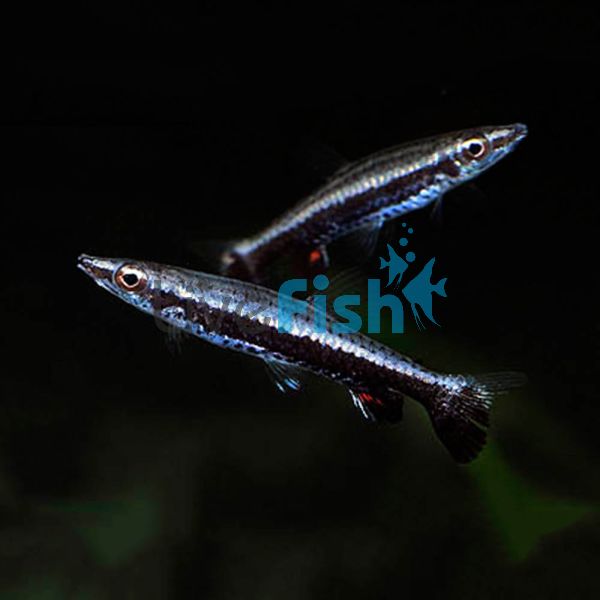Rockettail Pencilfish Wild 3cm
The Rocket Tail Pencilfish is an exquisite and lesser-known species that appeals to aquarists seeking something unique for their nano biotopes or densely planted aquariums. Its striking appearance and fascinating behaviour make it a desirable addition to an advanced aquarist's collection. Though they can be a bit more challenging to settle into a tank, once established, they make for a spectacular schooling species.
Rocket Tail Pencilfish - Wild Caught
The Rocket Tail Pencilfish is an exquisite and lesser-known species that appeals to aquarists seeking something unique for their nano biotopes or densely planted aquariums. Its striking appearance and fascinating behaviour make it a desirable addition to an advanced aquarist's collection. Though they can be a bit more challenging to settle into a tank, once established, they make for a spectacular schooling species.
The Rocket Tail Pencilfish is aptly named for its long, slender body and upward-tilted swimming posture, which resembles the angle of a launching rocket. Reaching a maximum size of around 5 cm, these fish are mostly bronze with thin horizontal black stripes that run along the length of their body. This striping is complemented by subtle red and orange tones that are most prominent near the caudal and anal fins. The sleek, streamlined appearance makes them simple yet one of the most visually striking pencilfish species available.
Breeding Rocket Tail Pencilfish in captivity is considered challenging. They are egg scatterers and require soft, slightly acidic water with temperatures between 24 - 28°C and a pH of 5.0 - 7.0. Providing a heavily planted setup with fine-leaved plants or spawning mops can encourage spawning. Like most pencilfish, they exhibit no parental care, so removing the adults after spawning is essential to prevent egg predation. The fry are extremely small and require microfoods like infusoria or rotifers until they grow large enough to accept baby brine shrimp or finely powdered flakes.
Tank Recommendations for your Rocket Tail Pencilfish
A small group of rocket tail pencilfish only requires a tank of 40 litres. This ensures that there's ample space for around 5 pencil fish, which will make them feel most comfortable. In the wild, pencil fish come from slow-moving, shallow waters that are dense with botanicals and plants. Though they will do fine in a high-tech planted aquarium, the required water parameters these fish need should be met. These pencil fish are not too fussed on hardscape and but a tight-fitting lid will be a requirement since they can jump.
suitable tank buddies.
Rocket tail pencilfish are very slow-moving and would do best being kept alone or with equally nano tank mates. These fish have very small mouths, and ensuring they are properly fed when other tank mates are present can be a challenge.
Usually compatible
Celestial pearl danios, peacock gudgeons, emerald Rasboras, and similar species are nano species.
Sometimes Compatible
Apistogramma, rams, and other territorial fish may show minimal but long-term aggression to the sensitive-natured pencil fish.
Rarely Compatible
Predatory South American cichlids and African cichlids will for sure make a meal out of the pencil fish.
Feeding your Rocket Tail PencilFish
Rocket tail pencilfish should take to foods quite easily, however, they require incredibly small foods. Their mouth is best shaped to eat small works, and their diet can easily consist of a nano pellet or flake along with white worms, microworms, and even black worms.
| Scientific Name | Nannostomus eques |
|---|---|
| Common Names | Rocket Tail Pencilfish |
| Diet | Omnivore |
| Fish Family | Lebiasinidae |
| Lifespan (years) | 3 |
| Max. Length (cm) | 4 |
| Min. Tank Volume (l) | 70 |
| Origin | Peru |
| Sociability | Peaceful |
| Venomous | No |
| Water Conditions | 24-26° C, pH 6.5 - 7.0 |
| Plant Safe | Yes |




